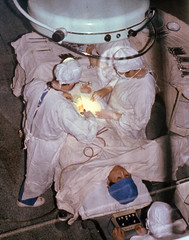 Acupuncture anaesthesia, Shanghai, 1977 by Quarrion (David)
Acupuncture anaesthesia, Shanghai, 1977 by Quarrion (David)
Using acupuncture in addition to or instead of anesthesia during surgery is an idea that is nearly unthinkable here in the west. That being said, electroacupuncture is often used in China as surgical anesthesia, as the stimulation is often stronger and easy to adjust the strength of the current. The points that are used are often specific to whatever surgery is being done.
Patients who use this method instead of going under general anesthesia often have an easier recovery, which means less nausea and vomiting, no lack of lucidity, and much less drowsiness. It's important that the patient be familiar with acupuncture, and also aware of any possible problems, as they will be awake during the surgery. I think the drug-free method of surgical procedures is a great idea, and a teacher of mine at OCOM took part in an acupuncture anesthesia a few years ago at OHSU.
Roger Lore, DAOM assisted with breast reconstruction surgery for a patient who had a mastectomy due to breast cancer. He describes the mood of the patient during the surgery as well has her quick recovery. He describes how the patient was lucid throughout the procedure, and that she was able to get off of the surgery table by herself after the procedure was finished. When the surgery took place at the Oregon Health Sciences University, acupuncture points were used on the arms, feet, scalp, and ears. The patient reported feeling some pain during the surgery, but refused any chemical anesthesia. She was very happy with the procedure, and felt much better than after surgeries where general anesthesia had been used.
You can read the article written by Dr. Roger Lore online at www.scalpacupuncture.org (scroll down to #6). For another great article that goes into more detail about the use of acupuncture anesthesia in China, check out www.gancao.net.
NOTE: If you want to see a video of a Cesarean section performed while the patient is only under acupuncture anesthesia, check out this link (it's not in English, by the way). WARNING! It is a graphic video of a Cesarean birth - if you are at all queasy with blood, body fluids, or birth, then stop the video at 5:15. If not, it's pretty cool...

